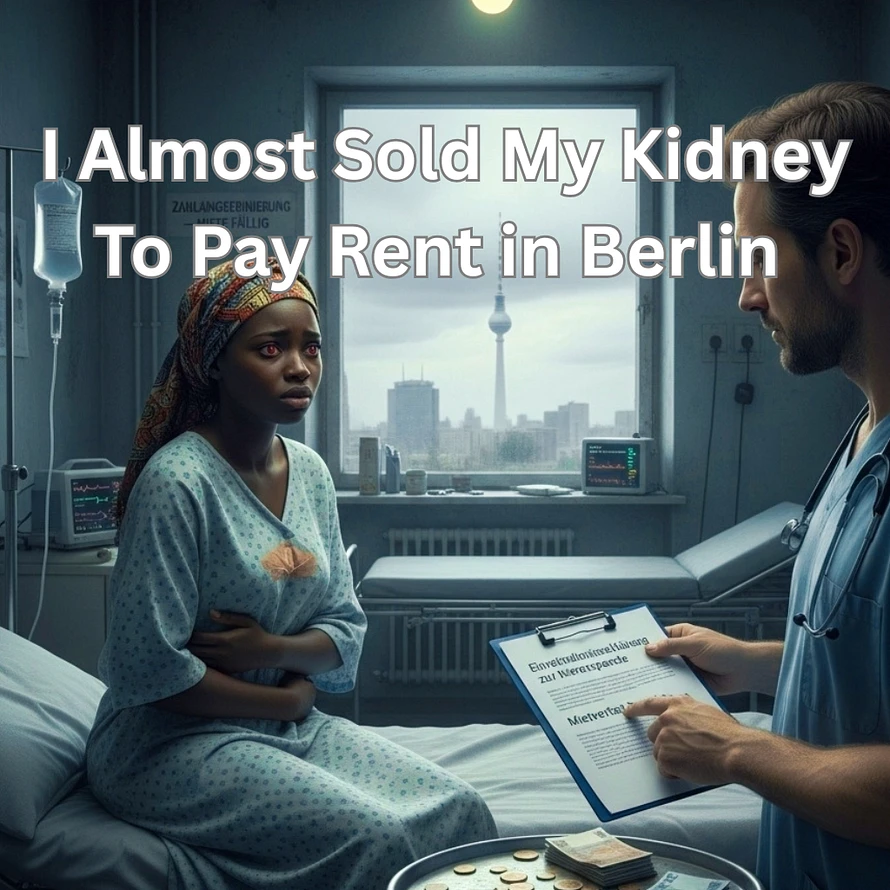I Almost Sold My Kidney to Pay Rent in Berlin
My name is Chioma, and I came to Berlin with dreams bigger than the Nigerian sky. I had a master's degree in Engineering, spoke three languages, and believed Europe would welcome my talents with open arms.
I was wrong. So terribly, devastatingly wrong.
Within six months, my savings were gone. The €800 rent for my tiny studio in Kreuzberg felt like a mountain I couldn't climb. My student visa didn't allow full-time work, and the part-time jobs I could find - cleaning offices at night, washing dishes in Turkish restaurants - barely covered my food.
I remember calling my parents in Lagos, pretending everything was fine while I hadn't eaten a proper meal in three days. "Germany is wonderful, Mama. I'm learning so much," I lied, while staring at an eviction notice on my door.
December in Berlin is brutal when you can't afford heating. I wore every piece of clothing I owned to bed, but still woke up shivering. The landlord's final notice gave me 72 hours to pay €2,400 or face immediate eviction.
I had €47 in my account.
That's when I saw the advertisement on a Facebook group for Nigerians in Germany: "Kidney donors needed. €15,000 compensation. Confidential. Safe procedure."
I stared at that post for hours. €15,000 would solve everything - rent, food, maybe even a chance to focus on my studies without the constant fear of homelessness.
I screenshot the contact information and spent the entire night researching kidney donation. The medical risks, the recovery time, the fact that I'd be giving away a part of myself to survive in a country that seemed determined to break me.
I had scheduled the meeting with the kidney broker for Thursday at 2 PM. But on Wednesday evening, something unexpected happened.
I was at the library, using their free WiFi to research the procedure one last time, when I overheard two Nigerian girls talking excitedly about something called "SkillPay Diaspora."
"Sister, I'm telling you, this program saved my life," one of them said. "I was about to drop out and go back to Nigeria, but now I'm making €3,000 a month doing digital marketing for companies back home."
My ears perked up. €3,000 a month? That was more than most Germans made.
"The best part is, you can do it on your student visa. It's all remote work for African companies, so it's completely legal. And they teach you everything - from social media management to web design to copywriting."
I approached the girls with trembling hands. "Excuse me, I couldn't help but overhear. What is this SkillPay Diaspora?"
Amaka, the one who had been speaking, looked at me with kind eyes. "Sister, you look like you need this as much as I did six months ago. Sit down, let me tell you everything."
That conversation lasted three hours and literally saved my life.
She showed me her laptop - client messages, payment confirmations, a thriving business she'd built from her dorm room. "The program teaches you high-income digital skills specifically designed for Africans in the diaspora. They understand our unique challenges - visa restrictions, time zone differences, cultural barriers."
I canceled the kidney meeting that night and used my last €99 to enroll in SkillPay Diaspora instead.
The transformation wasn't instant, but it was real. Within two weeks, I had my first client - a Lagos-based fashion brand that needed social media management. €400 for my first month's work.
It wasn't much, but it was hope. Real, tangible hope.
By month three, I was managing social media for five different African businesses. By month six, I had expanded into web design and copywriting. The skills I learned through SkillPay Diaspora weren't just theoretical - they were immediately applicable and in high demand.
Today, eighteen months later, I run a digital agency that serves over 30 African businesses. I've moved to a beautiful two-bedroom apartment in Prenzlauer Berg. I send money home to my parents every month. Most importantly, I kept both my kidneys and my dignity.
The program didn't just teach me skills - it gave me a community of other Africans in the diaspora who understood the struggle and were committed to lifting each other up.
Transform Your Life Like Chioma Did
Chioma's story could have ended very differently. If you're struggling in the diaspora - whether in Europe, America, or anywhere else - you don't have to make desperate choices to survive.
SkillPay Diaspora is specifically designed for Africans living abroad who need to build sustainable income while navigating visa restrictions and cultural barriers. Learn the exact digital skills that are transforming lives across the diaspora.
Your breakthrough is one skill away.

